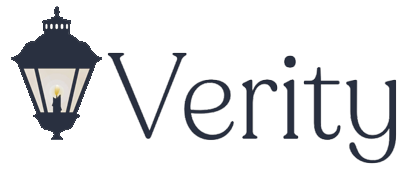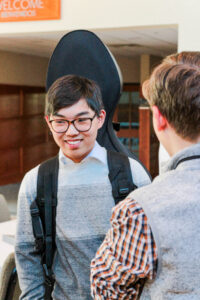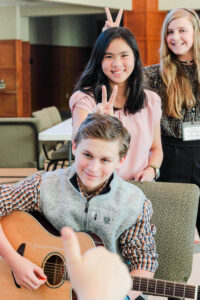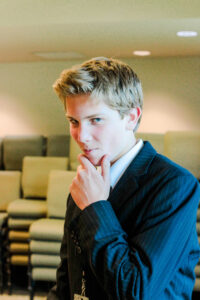Varsity Speech Events
Verity follows Stoa guidelines for all Varsity speech events. Please visit the Stoa website to find the rules, ballots, and explanations for each event.
The age range for Verity’s Varsity speech events is 12-18. Your child’s age is evaluated as of October 1st each year. Therefore, if your child turns 12 on October 2nd, for Verity, and our national league (Stoa), their age for the year would still be 11.
*Please note that not all tournaments will offer all events.
Limited Prep Events
Interpretive Speech Events
Competitors get a limited time to prepare for a speech on a topic that is given to them at the speech event. Preparation before the tournament is described in the event rules.
Apologetics
In Apologetics, the competitor is given four (4) minutes to prepare a persuasive and reasoned speech that defends a tenet of the Christian faith and explains why that principle matters.
Extemporaneous
In Extemporaneous speaking, the competitor answers a given question based on recent events in the news. The competitor researches national and international current events and may create reference files of newsworthy information. Extemporaneous speech should be regarded as a demonstration of personal knowledge on the topic, as well as an original synthesis of numerous sources.
Mars Hill
In Mars Hill, the competitor uses books, movies, and other genres to discuss the appeal and impact of the theme(s) within the topic, holding them up in light of Christian truth found in the Bible. This event is intended for competitors 14 and older or with the consent of the parents due to mature themes in some topics.
The competitor is given two (2) minutes to prepare a speech on a randomly drawn prompt. The goal is to develop a winsome, polished speaker who can present an original, spontaneously prepared speech.
In all interpretive events, competitors write, or select and analyze literature, then bring it to life through the creative use of voice, movement, and facial expression, without the aid of costumes or props.
Duo Interpretation
In Duo Interpretation, two competitors create an original rendition of a story from one or more selection(s) of literature which captivates and moves the audience.
Humorous Interpretation
In Humorous Interpretation, the competitors tell relatable stories using humor as a device to connect with the audience from a single published work. Stand-up comedy, or telling a series of jokes without a corresponding plot, is not Humorous Interpretation.
Open Interpretation
In Open Interpretation, selections may be in the whole range from dramatic to humorous genres, including narrative storytelling, single voice monologues, thematic compilations, or self-written pieces.
Dramatic Interpretation
In Dramatic Interpretation, the competitor, using a play, short story, or other published work, performs a selection with a spotlight on character development and depth which captivates and moves the audience.
Wildcard Event
Platform Speech Events
New and unique speech events that are offered on a two-year rotation meant to challenge competitors in their preparation and presentation skills
Slam Poetry
Slam poetry is a form of performance poetry that combines the elements of interpretation and audience participation. The poem can be original or crafted from one or more sources. The piece demonstrates effective use of poetic devices, which will include figurative language and/or thoughtful vocabulary. The poem which effectively uses rhythm and sound of language will convey an idea and/or a point of view. Capturing and conveying human emotions and experiences may stimulate audience interaction, in that the audience can slam the table (like knocking in Parli). This event will use “OI type” rules and must be memorized.
A prepared speech, written by the competitor, with the purpose of informing, exposing, or persuading on a topic.
Expository Speaking
An Expository is a prepared speech written by the competitor which explains and illustrates a topic through both words and visuals (e.g. illustrated boards, physical props, digital and electronic presentations, or any combination).
Original Oratory
An Original Oratory is a prepared speech, written by the competitor, on a topic of the competitor’s choice. The purpose of this informative speech is to explain, describe, or expose the topic.
Persuasive
A persuasive speech is a prepared speech, written by the competitor, which advocates a specific position or course of action.



